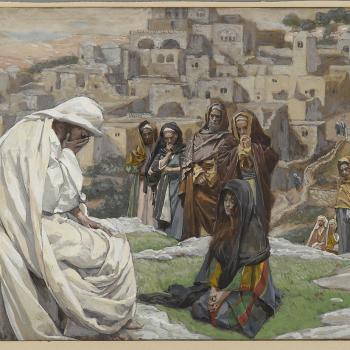 The Bible is a story of liberation of an oppressed people chosen to be God’s own. Can the many peoples who struggle for liberation today but don’t count themselves among the Bible’s chosen ones own that story? Can women? People of color? Is the Bible free of the sexism and imperialism that so well characterizes human history? Episode 16-3 of the Rowing with Michael Series: A journey through the Jewish/Christian Scriptures in Verse and Commentary. Introduction and Contents for this series HERE.
The Bible is a story of liberation of an oppressed people chosen to be God’s own. Can the many peoples who struggle for liberation today but don’t count themselves among the Bible’s chosen ones own that story? Can women? People of color? Is the Bible free of the sexism and imperialism that so well characterizes human history? Episode 16-3 of the Rowing with Michael Series: A journey through the Jewish/Christian Scriptures in Verse and Commentary. Introduction and Contents for this series HERE.
Michael, row the boat ashore, Alleluia! ….
People from North, South, East, and West, Alleluia!
Coming together, all are blessed. Alleluia!
This is the last post in the series where we row through Old Testament stories with Michael and his song. The Bible turns out to be neither straight history nor incontestable answers to life’s perennial questions. Still, the Bible is neither irrelevant and silly nor backward and pernicious. A person approaches the Bible with already well-formed or just barely conscious ideas, values, and instincts. One meets there a conversation partner and finds that one can agree or argue. Either way one grows in the process.
Liberation for one oppressed group of people is the Old Testament’s central story. God chooses the Jews and not another nation or ethnic group. In the New Testament God narrows that choice down to one individual, a man and not a woman. At this fundamental level has the Bible been discriminating all along?
It helps a little that God’s chooses independently of any recognizable human excellence and that God’s purpose is to bless all peoples through the ones chosen. Being chosen often seems more burden than blessing. But humans do seek out paths to meaning in their lives, including difficult, burdensome tasks. But how does a Chinese person find affirmation as Chinese in a God of the Jews? How does the man Jesus affirm woman as woman?
God’s daring move
Here’s a closer look at what God is doing. Some call it the scandal of particularity. C. S. Lewis calls it a “daring” move. Paul calls it “emptying.” I think of it as self-denying and other affirming.
God decided to join the historical process on earth as one historical fact amidst all the others on one small planet. God, who in one sense is Being-itself, chose to be this being and not that one, there and not some other place, then and not some other time. Out of the vast temporal and spatial span of the universe, God chose a tiny speck.
In the history and geography of Earth, God chose to start a work of liberation with not much more than a thousand years out of 5 billion and a few hundred square miles east of the Mediterranean Sea. God chose a mixed collection of people—farmers escaping the collapsing rule of tyrants, nomads, and possibly escaped slaves from Egypt—who eventually became a group with a culture we know as Jewish.
Out of this group (if Christianity is correct) God chose a single individual, a carpenter of rather low estate, a man who lived only into his mid 30’s. In Jesus God gave up all the other possibilities—the other sex, other colors, other sizes and shapes, other occupations and social statuses, other cultures—for a career as only one of each of these human variables.
God’s “Yes!”
Here’s the payoff. This emptying and self-denial, saying no, on a grand scale, affirms everything. Let me explain:
- By incarnating in a particular location in time and space, God says “Yes” to every other cosmic fact, which necessarily has only one particular time and place.
- By being historical but not all of history, God says “Yes” to every other historical moment that is only part of the whole.
- By being only the one size and shape of a particular human being, God affirms the mountain and the ant and every other thing and person, which can only be one size and shape.
- By having a particular occupation, social status, and especially culture, God is just like all the rest of us human beings, who can’t possibly be everything but are limited to particular occupations, statuses, and cultures.
- By being only one sex God, incarnate in the man Jesus, is just like each of us, man or woman. We necessarily are only one sex.
- By being a fragment, God affirms our necessarily fragmentary existence. We can’t be everything or even all the things we might want to be. God offers liberation, but not from our limited existence, not liberation from being human. Rather, God frees us to be the finite, loved creatures that we are.
Jesus says he was sent “to the House of Israel.” His mission was to exercise God’s love in that particular place, among those people. Far from making the other places and peoples of less account, Jesus affirms all human loves everywhere, which necessarily start out in small, particular places and among a smallish band of family and neighbors before extending to wider communities and finally making the world a neighborhood and everyone a neighbor.
A larger table
The problem at the beginning of this commentary was why God should choose one culture, one sex, one value in each of many variables, and leave aside all the others. It seemed unfair. But sharing equally in all cultures, being “fair” to everyone, means not having a culture at all. Having one culture is a way to affirm all. Having one sex is the only way to be sexual or human. This is the blessing to all the communities of the earth that God promises in the Abraham story. It’s the only way God could be like us, one of us, as opposed to hovering benevolently over all, equidistant from all. God blessed the whole human condition by adopting one culture, one sex, one particular way of being human, and becoming incarnate as one Jew, Jesus.
There’s no explaining why God’s choice of a culture landed on the Jews. God is mysterious as to the reasons for his choices. But if we learn one thing about God’s choices from the pages of the Old Testament it’s this: Being chosen does not mean being better than somebody else. The Bible’s God chooses some unexpected protagonists. God didn’t choose the Jews because their culture and their ideas about the world were better or truer than anybody else’s.
It wasn’t a new culture, either, that God was starting, replacing whatever culture these people had with “the truth of the Bible.” Like any human creation the Bible needs to be debated historically, scientifically, and even morally and theologically. God took up a place in one corner of the world and allows room for other corners to be the gifts that they are. Imagine the table fellowship that Jesus practiced and Paul followed expanded to include a whole world of peoples and cultures, all contributing their own special graces.
A realistic look at Christian history
At this point the story turns darker. Jesus’ welcoming table, echoing God’s “Yes” to everything genuinely human, contrasts sharply with much Christian practice. Christians fought wars over who had the “right” religion. They separated Jews into ghettos or banished or killed them or forced them to convert. Indigenous religious practices were condemned. Christianity had become Roman, and Roman customs and the Latin language ruled. Even today Christianity bears an entirely too European stamp to speak convincingly God’s “Yes” to a multi-cultural world.
But brighter parts of the story are also there. Today, while Christianity declines in Europe, it is advancing in much of the rest of the world. Africa, Latin America, and Asia, are the new centers of Christianity. Liberation theologies are chronicling experiences of poor and oppressed peoples. Missionaries are speaking of African, Latino/a, and Asian Christianities. We could be in for interesting times as the center of Christianity shifts to the South and East and away from centers of prosperity and power.
Christian churches are making sincere commitments to dialogue, with each other and with other world religions. Among fundamentalist Christians some still imagine fighting diabolical religions and saving “lost souls.” In contrast, Catholic and mainline Protestant missionaries find God’s grace wherever they go. Often they claim that they receive more than they give.
During the three centuries before it acquired the power of the Roman Empire, Christians could promise little new by way of reward except persecutions. But Christianity was advancing throughout the Roman world. Why? There was the promise of eternal life after this one, but I don’t think that’s what drew people in. Other religions and philosophies also promised a blessed life after death. One new thing Christians had was not an idea. It was the memory of a series of events, one-time occurrences in one identifiable corner of the world. It was a novel way of reading God’s activity–in things happening here on earth.
Not just a novel interpretation by clever intellects, either. There was the conviction, played out in Christian lives, that something new has happened. Ordinary, limited, partial and fragmentary things had a new value and excellence. That’s what you might call “good news or “blessing for all the families of earth.”











